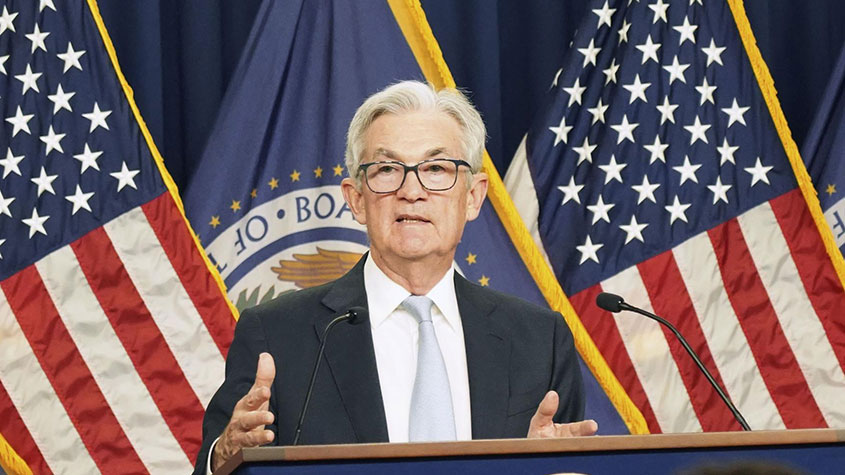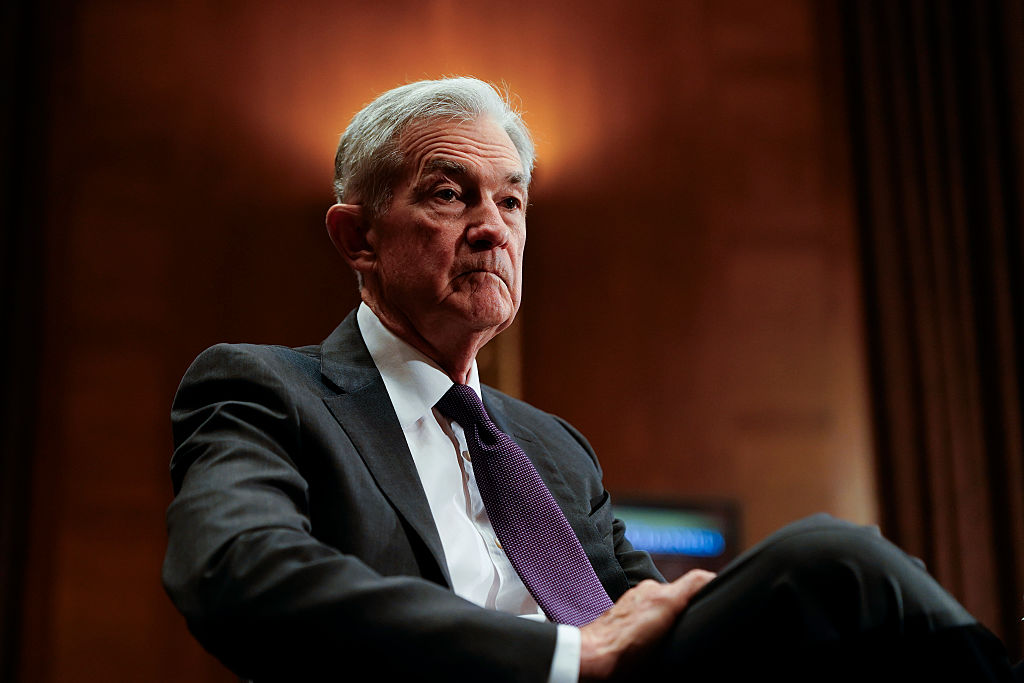Federal Reserve hikes interest rates to 4%
The Federal Reserve continues its battle with inflation with another bumper interest rate hike.


Get the latest financial news, insights and expert analysis from our award-winning MoneyWeek team, to help you understand what really matters when it comes to your finances.
You are now subscribed
Your newsletter sign-up was successful
Want to add more newsletters?

Twice daily
MoneyWeek
Get the latest financial news, insights and expert analysis from our award-winning MoneyWeek team, to help you understand what really matters when it comes to your finances.

Four times a week
Look After My Bills
Sign up to our free money-saving newsletter, filled with the latest news and expert advice to help you find the best tips and deals for managing your bills. Start saving today!
The US Federal Reserve hiked interest rates by 0.75% for the fourth time in a row on Wednesday as the central bank continues its fight against inflation.
Following the hike, the federal funds rate, which sets the borrowing benchmark for everything from credit cards to trillions of dollars of financial derivatives that underpin the global financial system, stands at 3.75% to 4%.
However, it looks as if the central bank is going to adopt a more cautious approach when it comes to rate hikes going forward.
MoneyWeek
Subscribe to MoneyWeek today and get your first six magazine issues absolutely FREE

Sign up to Money Morning
Don't miss the latest investment and personal finances news, market analysis, plus money-saving tips with our free twice-daily newsletter
Don't miss the latest investment and personal finances news, market analysis, plus money-saving tips with our free twice-daily newsletter
The Federal Reserve warns rate rises may slow
According to the central bank’s commentary published alongside the rate decision, it will now be taking into account how far rates have already risen this year, as well as taking into account the time it’ll take for increases to filter through into the real economy when setting rates in future.
Wall Street initially interpreted this statement as meaning that the bank will ease off on increasing rates going forward, but that view was soon squashed.
In a press conference after the rate change was announced, Federal Reserve chairman Jay Powell warned that the so-called “terminal” interest rate (the rate the Fed believes will be needed to tame inflation) will be higher than expected.
In other words, it looks as if the bank is prepared to push rates a lot higher to tame inflation.
Bringing inflation back down to target
The US central bank is aiming to get inflation down to its target of 2%.
By hiking interest rates, the theory is that consumers will look to save more money and businesses will slow spending. This should drive companies to lower prices as they fight over customers’ reduced spending power.
As of yet, it does not look as if higher rates are having the desired effect.
The US inflation rate hit 8.2% in the 12 months to the end of September, higher than forecast, although it was lower than the 8.3% recorded in August.
More importantly the measure of inflation that strips out the volatile food and energy components jumped to 6.6%, the fastest rate since 1982.
It’s this rate that’s worrying the Fed and economists. It means housing and medical costs are still rising and inflation is becoming entrenched in the economy.
That’ll make it harder to control as workers demand higher wages to compensate for increased costs.
What does the Federal Reserve’s war against inflation mean for you?
As the Fed hikes rates further, the cost of credit is rising. The most obvious market where this is having an impact is the mortgage market. The 30-year mortgage rate reached 7.08% last week. That’s the highest level since 2002.
The impact this will have on house buyers’ purchasing power, and as a result, the housing market, cannot be understated.
In December last year, when an average 30-year mortgage cost 3.11% the monthly repayments on a $300,000 would have been around $1,283. Today, the cost to buyers is $2,012 a month.
This suggests either house prices are going to fall, or those with mortgages are going to have to cut back on spending in other areas.
Elsewhere consumers are going to face higher borrowing costs and higher costs in general as companies will likely pass their higher interest costs onto consumers. These price hikes could only add fuel to the inflation fire.
On the other hand, as rates move higher the value of the dollar is surging. This will reduce the cost of imported goods and services and make it cheaper for American consumers travelling overseas.
Remember to get your tickets for the MoneyWeek Wealth Summit hosted by Merryn Somerset Webb, on 25 November 2022! – we’ve got some brilliant speakers lined up and, given everything that’s going on, we’ll have an awful lot to talk about.
Book your place now at moneyweekwealthsummit.co.uk
Get the latest financial news, insights and expert analysis from our award-winning MoneyWeek team, to help you understand what really matters when it comes to your finances.

Rupert is the former deputy digital editor of MoneyWeek. He's an active investor and has always been fascinated by the world of business and investing. His style has been heavily influenced by US investors Warren Buffett and Philip Carret. He is always looking for high-quality growth opportunities trading at a reasonable price, preferring cash generative businesses with strong balance sheets over blue-sky growth stocks.
Rupert has written for many UK and international publications including the Motley Fool, Gurufocus and ValueWalk, aimed at a range of readers; from the first timers to experienced high-net-worth individuals. Rupert has also founded and managed several businesses, including the New York-based hedge fund newsletter, Hidden Value Stocks. He has written over 20 ebooks and appeared as an expert commentator on the BBC World Service.
-
 New PM Sanae Takaichi has a mandate and a plan to boost Japan's economy
New PM Sanae Takaichi has a mandate and a plan to boost Japan's economyOpinion Markets applauded new prime minister Sanae Takaichi’s victory – and Japan's economy and stockmarket have further to climb, says Merryn Somerset Webb
-
 Plan 2 student loans: a tax on aspiration?
Plan 2 student loans: a tax on aspiration?The Plan 2 student loan system is not only unfair, but introduces perverse incentives that act as a brake on growth and productivity. Change is overdue, says Simon Wilson
-
 How a dovish Federal Reserve could affect you
How a dovish Federal Reserve could affect youTrump’s pick for the US Federal Reserve is not so much of a yes-man as his rival, but interest rates will still come down quickly, says Cris Sholto Heaton
-
 New Federal Reserve chair Kevin Warsh has his work cut out
New Federal Reserve chair Kevin Warsh has his work cut outOpinion Kevin Warsh must make it clear that he, not Trump, is in charge at the Fed. If he doesn't, the US dollar and Treasury bills sell-off will start all over again
-
 'Investors should brace for Trump’s great inflation'
'Investors should brace for Trump’s great inflation'Opinion Donald Trump's actions against Federal Reserve chair Jerome Powell will likely stoke rising prices. Investors should prepare for the worst, says Matthew Lynn
-
 'Governments are launching an assault on the independence of central banks'
'Governments are launching an assault on the independence of central banks'Opinion Say goodbye to the era of central bank orthodoxy and hello to the new era of central bank dependency, says Jeremy McKeown
-
 Will Donald Trump sack Jerome Powell, the Federal Reserve chief?
Will Donald Trump sack Jerome Powell, the Federal Reserve chief?It seems clear that Trump would like to sack Jerome Powell if he could only find a constitutional cause. Why, and what would it mean for financial markets?
-
 Can Donald Trump fire Jay Powell – and what do his threats mean for investors?
Can Donald Trump fire Jay Powell – and what do his threats mean for investors?Donald Trump has been vocal in his criticism of Jerome "Jay" Powell, chairman of the Federal Reserve. What do his threats to fire him mean for markets and investors?
-
 Do we need central banks, or is it time to privatise money?
Do we need central banks, or is it time to privatise money?Analysis Free banking is one alternative to central banks, but would switching to a radical new system be worth the risk?
-
 Will turmoil in the Middle East trigger inflation?
Will turmoil in the Middle East trigger inflation?The risk of an escalating Middle East crisis continues to rise. Markets appear to be dismissing the prospect. Here's how investors can protect themselves.